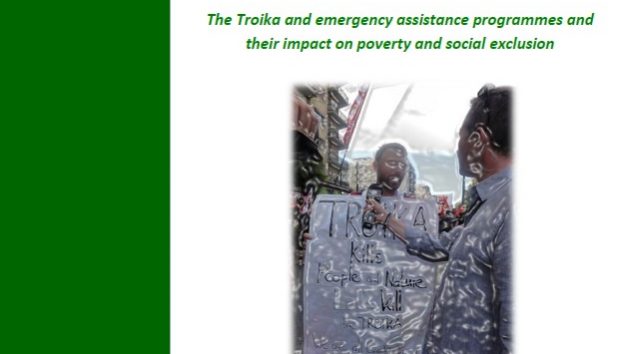Under these Troika arrangements, the loans are provided at below market rates, disbursed in tranches over three years. Disbursement is subject to strong macroeconomic and “structural” conditionality through closely monitored programmes agreed in binding Memoranda of Understanding (MoU) with recipient governments.
In 2012, EAPN created a dedicated Task Force to study the impact of the MoU on poverty and social exclusion, looking at five countries under such arrangements (Greece, Ireland, Portugal, Romania, Spain), and a sixth – the United Kingdom.
Greece, Ireland and Portugal are the three Eurozone states. Romania is in the same situation, but, as in the case of Hungary and Latvia, the European Central Bank is replaced by the World Bank, as these countries are not yet in the monetary union. Spain, a Eurozone country, has received external financial assistance for the recapitalisation of its banks, with macroeconomic conditionality attached.
The UK is not in receipt of external financial assistance, is not in the Eurozone, and it is also one of only two Member States out that have not signed up to the Fiscal Compact. However, even if its domestic policy is the least constrained by European governance, the high public debt, and severe imbalance of payments led the UK government to undertake a similarly severe domestic three-year fiscal squeeze, expressed in its Comprehensive Spending Review of 2010.
Over the past two years, the Task Force members have collected evidence on the impact of the economic assistance programmes on poverty and social exclusion, with particular reference to the “austerity” programmes, and aiming to clarify to what extent Troika intervention is part of a broader ideological agenda, which underpins current EU policy, including the Fiscal Compact and economic governance, for members of the Eurozone and beyond, attempting to answer these questions:
- What is the role and impact of the assistance programmes? Is there a common agenda in the Memoranda of Understanding? If so, what is it?
- Why did the “bail-out” states need it – what were the types of unpayable debt, and why? Is “bail-out” an accurate description of what is actually happening?
- What is the likely impact, on states’ capacity to combat poverty, of economic adjustment programmes?
- To what extent have the Member States in such programmes been able to influence the conditions in their Memoranda of Understanding?
- Are there indications that Member State governments or Troika institutions are using the emergency assistance process to further their own agendas?
- Internally, are we all “in it together”, or are some groups suffering more from the crisis and the response to it?
- What is common and what different in the austerity responses of the states, and why?
- What difference to policy options does it make being a member of the Eurozone?
- What is the role of the European Commission and economic governance on the policy frame in which Member States may act?
- What are the likely outcomes for poverty in 2020?
This report is the synthesis of the Task Force findings. The Key Messages are clear, and extremely worrying:
- The Memoranda of Understanding are an extreme example of an overall unsustainable development model
- No real solution to real problems
- Regressive measures hit the most vulnerable
- National Governments have a key role to play
- External interference undermines subsidiarity and the Treaty of the European Union
- The European Commission is defaulting on its obligations
- Lack of democracy breeds lack of faith in national and European institutions
You can download the FULL REPORT here.
Additionally, you can consult the full Annexes of the report:
Appendix 1 – Methodology for producing this report
Appendix 2 – Summary of the financial assistance (loans) available to EU Member States that is led by EU institutions
Appendix 4 – Analysis of the economic situation in Greece, Ireland, Portugal, Romania, Spain and the UK, using data adapted from Eurostat, including the Macroeconomic Imbalances (MIP) Scoreboard.
Appendix 5 – Country fiches prepared by the Task Force representatives:



